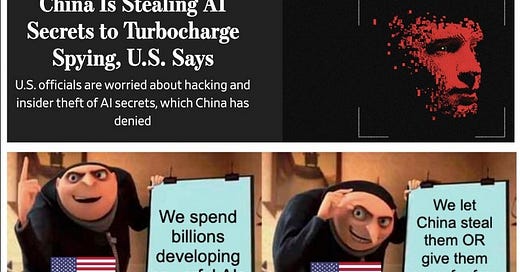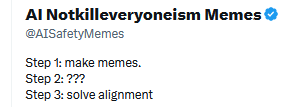Courtesy of
I’m well acquainted with the national security community, having spent 17 years around people whose full-time job it is to think about the adversaries who threaten the US. Huge quantities of money, time, and mental effort are spent hatching various strategies to stop them.
That community is usually highly aware of potential threats, and some would say, with historical justification, too aware. During the Cold War, the national security establishment pushed the threat of “the Bomber Gap” and “the Missile Gap.” They worried that the Soviet Union was far ahead of the United States in nuclear “delivery systems,” which might make the Soviets think they could get away with a nuclear first strike. With historical hindsight, we now know the quality and number of the Soviets’ delivery systems were vastly overestimated. The Soviets fell behind, and could never catch up.
That same national security community is now worried about AI and China, which is entirely reasonable. It’s why the Biden Administration has restricted China’s access to NVIDA’s cutting-edge AI chips. That makes sense, as far as it goes. Practically speaking, AI can also be built with the slightly slower NVIDIA chips China can still purchase. It will just take more of them and use more energy to operate them, neither of which is an insurmountable obstacle.
The US is widely acknowledged to have the lead in the global race for AI at this moment in time. As a broad-spectrum technology, AI inherently has many military applications, meaning it is “dual-use.” The United States government usually tightly regulates who can access the best dual-use technologies. Whether we are talking about machine tools that can build weapons parts, or computer tech that can control the machine tools building weapons, restrictions on dual-use tech are designed to make sure US companies only sell dual-use stuff to countries that aren’t axiomatically opposed to core values of the US, like democracy and a free press.
Otherwise, what our companies sell may well be turned against us one day—which brings us to a fun historical quote from smilin’ “Uncle Joe” Stalin, one of the most murderous communist psychopaths to ever walk the earth: “When we hang the capitalists they will sell us the rope we use.”
In a situation where US companies have the edge in a major (and possibly the last major) dual-use technology, our national security folk would usually be especially vigilant about maintaining that edge.
Enter Meta, which routinely releases open-source AI models that make sure the Chinese AI development community is rarely more than six months behind the state of the art in the US.
If this were any other dual-use technology, there would be bipartisan congressional hearings raking Mark Zuckerberg and his AI development chief, Yann LeCun, over the coals. Instead, not only has Meta gotten a pass so far, but our lawmakers sit silently while Zuckerberg and LeCun minimize the potential risks of open-source AI. LeCun in particular takes glee in expressing sneering contempt for anyone concerned about the large number of bad things AI without safety rails (and those on Meta’s LLAMA are infamously easy to remove) can be used for.
Hopefully, the national security community will soon realize allowing the Chinese Communist Party, the spiritual offspring of “Uncle Joe” Stalin, access to Meta’s latest AI models = a really bad idea. Until then, the CCP’s cyberwarriors will keep hitting “refresh” on Meta’s website to get access to the latest iteration of LLAMA.
But have no fear. Meta’s Terms of Service explicitly warn Xi’s apparatchiks that they’re not allowed to use LLAMA for bad things! And we can be sure Meta’s attorneys will send the CCP a very pointed note if the same government that has thrown a million Uighurs into modern-day gulags where they’re forced to pick cotton at gunpoint decides not to follow the legal niceties of their biggest adversary.







Never underestimate the effect of a "strongly worded letter" to change the minds and hearts of those who hold no value for human life, just a utopic vision of a world under communist control.